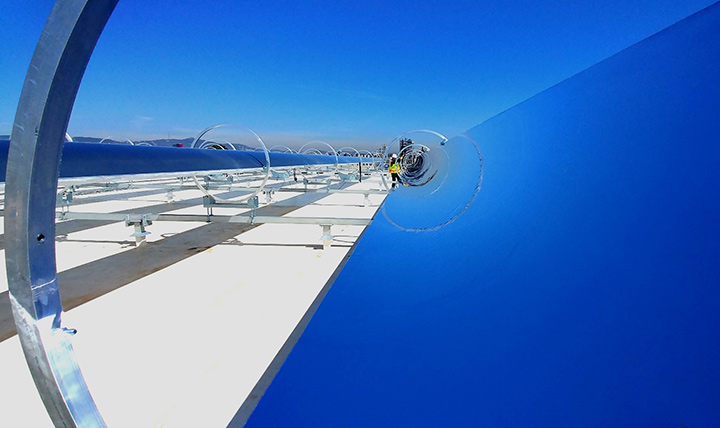Rackam’s solar thermal solutions warm up international industry

Rackam is a solar thermal solutions company whose youthful leadership burns with determination to help shift industry away from its dependence on fossil fuels to produce heat.
Jacques-Alexandre Fortin, vice-president of the Sherbrooke, Quebec-based company, says Rackam was established in 2009 under an ambitious vision to use the sun’s energy to fuel industrial heating systems.
“We wanted our social commitment and our technology to play a part in a cleaner, fair and more humane world,”
says Fortin. “What motivated us in the early years as we travelled along this path was that we saw potential and actual solutions that were in fact not popular that were not being used.”

Instead of using fossil fuels for industrial heating, drying, cooling and refrigeration systems, Rackam’s systems use automated, sun-tracking parabolic mirrors to collect and concentrate solar heat for thermal power.
“We provide thermal solutions,”
says Fortin. "So unlike panels that produce electricity, we convert sunlight to heat that replaces the combustion of fossil fuels, and consequently, lowers greenhouse gas emissions.”
One of Rackam’s recent projects provided an inspiring perspective on the company’s solar solutions for industry. Fortin remembers standing by Rackam’s gleaming installation of parabolic solar collectors on the rooftop of the Elis industrial laundry facility in Barcelona, Spain, and looking out over a panorama of the coastal city. Elis uses the heat generated by the rooftop solar collectors to provide thermal power for laundering linens and clothes in the high-tech facility.
Outside of Canada, Rackam also has 12 projects around the world that combine this eco-friendly approach with energy efficiency, including in Brazil, Greece, Morocco, Portugal and the United States. For support in accessing international markets, Rackam has reached out to the Canadian Trade Commissioner Service (TCS).
“We’ve been getting help and funding from TCS for years,”
says Fortin. “The hardest thing about exporting is understanding the local context and elements. You need to factor in the local way of doing things: the resources, travel, support, technological barriers and communication.”
CanExport funding provided through the TCS helped the company to target Spain and Mexico.
We are established in nine different countries, and I’m planning my trip to China next.
“We need to focus and find additional investment while the market matures. When exporting, it is important to ensure both the product and the market are ready for you,”
says Fortin.
- Date modified: